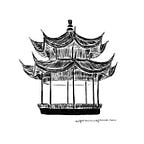There are always many ways on how to use different characters or words to express a specific meaning in Chinese. Mostly, it relates to subtle differences in meaning or grammatical structures specific to the Chinese language.
Another reason for using different words in some sentences is the rhythm of the Chinese language. Sentences are perceived as sounding better when they follow a certain flow, which depends on tones and on the number of syllables used.
This point was stressed often by our teachers and explained in various examples, as in the one you can see below. There might be various ways of expressing one thing, like in the example below, but one will “sound nice” (好听).
There is something to be said about the use of symmetric syllables in the Chinese language. As you can see in the image below, also from one of my classes, the different parts of the sentence should have an equal number of syllables as a pattern in order to sound harmonious.
The first part starts with a 3-syllable pattern and is followed by a three-syllable pattern, thus the 4-syllable pattern in the second part should also be followed by a 4-syllable pattern, which is why the 也 should be added
Specific grammatical structures to obtain rhythm
This even comes up in specific structures sometimes. One example is the character 各 (gè), meaning “any”. It can only be used with a one-syllable character. For example “every country” can be expressed as 各国 (gè guó)。Technically country is translated as 国家 (guójiā) though. If you want to use this word in combination with 各( gè) you will have to add the measure word 个 (gè) to make it a 2+2 sound: 各个国家 (gè gè guójiā).
As I learn more and more Chinese, another important pattern arises in the context of melody. Often, words are almost randomly shortened or used in full depending on the context. The reason for this is the melody of the language, where sometimes there is simply no room for longer words. Or as one of my Chinese teachers put it: people are sometimes lazy. Here are some examples:
- 但是 (dànshì) means “but”, but more often than not I see only 但 (dàn) in the sentence, which refers to the same “but”.
- 比较 (bǐjiào) means “to compare”, but is sometimes shortened to 比 (bǐ). The trouble is 比 (bǐ) can also simply mean “than” or “to” in a comparison or score.
- 要不然 (yàoburán) means “otherwise”, but can just as well be shortened to either 要不 (yàobù) or 不然 (bùrán). Are you confused yet?
Originally published at https://experiencingchina.com on January 18, 2021.
